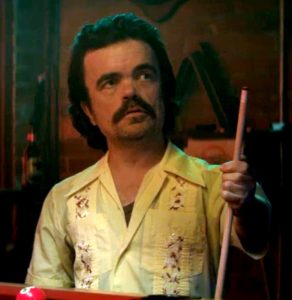My Rating: 10/10
Should I watch this?
One of my favorite movies of 2017, so, yes.
 I’m sad to say that this is the first Martin McDonagh film I’ve ever seen.
I’m sad to say that this is the first Martin McDonagh film I’ve ever seen.
Three Billboards in Ebbing, Missouri, is extremely well-written, well-cast, and well-made. The story follows Mildred Hayes (Frances McDormand), the mother of a murdered young girl who takes on the police for failing to find the culprit. We are treated to fantastic humanity, flawed but endearing characters, and a story that answers all the questions it asks itself except for, “Who was the murderer?”
When I read the premise of the film, I knew two things immediately:
- I should not count on learning who killed Mildred’s daughter.
- If I learn who it was, I’ll be disappointed.
The film feels like it’s based on a true story, but it’s not. The excellent and authentic casting gives it an almost documentary feel, as does the casting of Sandy Martin, the go-to dysfunctional mother of immature white dudes. This I say with absolute love and admiration, because Sandy won my heart as Mac’s mother in It’s Always Sunny in Philadelphia.

It’s hard to avoid talking about the multi-dimensional aspects of all of the characters in this film, because they’ve been written so well. The dialogue is smart, but doesn’t try too hard, so we’re mostly spared pretentious monologues about right and wrong, which is wonderful because we all know that rape and murder is wrong. Well, most of us do, anyway.
Mildred Hayes is indeed the self-righteous, angry mother we’ve seen before, but she’s also flawed and shows zero restraint when it comes to revenge for her mistreatment. She’s unafraid of anyone, and uses her suffering as an armor to do what needs to be done, no matter how many mistakes or regrets she’ll feel along the way. Mildred will not be bullied or coerced, because in her mind she’s championing the cause of her violated daughter.
A character who undergoes a startling transformation, Jason Dixon (Sam Rockwell) starts out as a repugnant (but somehow likable) racist who is clearly abusing his authority as a police officer. He seems to take the billboards as a personal affront, though only Chief Willoughby (Woody Harrelson) is named. We can admire Dixon for his admiration and loyalty to Willoughby, especially since it is the words of the latter that inspire Dixon to reform himself, dispel his anger, and take steps down the road of redemption. Initially, I went from wishing Dixon would just going away, to clapping my hands when he allows himself to get his ass beat to get DNA from a potential suspect.

Chief Willoughby, though we are encouraged to hate him from Mildred’s perspective, is a just police officer who manages to keep a leash on Dixon (at least while he’s alive). A more commercial approach would’ve been for the billboards to spur him to action, to get him to solve the case. But as he reveals in a heartbreaking and amazing display of acting with Mildred, he’s dying from cancer, and appeals to her for for some leeway. Instead, he ends up killing himself, taking control of his life, ending it in a way of his choosing, rather than simply waste away in front of his wife and daughters.
I could continue to dissect the characters this way, but I think that it’s not only a waste of time, but I wouldn’t do the performances and the writing justice.

Though the film deals with a lot of tough issues like death, injustice, racism, and abuse, it manages to still be entertaining. Something that we can’t forget about film, well, that I shouldn’t forget about film, is that it is first and foremost entertainment. It is escapism to its very essence, giving us a few hours to forget our own problems and go somewhere else for a little while. Experimentation, breaking the rules, and weird art films are fun and interesting, but there’s something about a film like Three Billboards that is so refreshing. McDonagh made a meaningful film with a strong message of forgiveness and acceptance, but managed to harness and maintain an aura of humor that made us unable to turn away.
Some movies are too hard to watch again, because the feeling was altogether so unpleasant, why would you want to? Three Billboards takes that unpleasantness head on, and reminds us that even though reality can be miserable, there’s no reason we can’t make the best of it. I feel like I could watch this movie over again, going through the roller coasters of sorrow, dysfunction, and dark humor until I’ve had enough.

A particular moment stood out to me, that I think was instrumental in delivering the voice of the filmmakers. Dixon is wheeled into a hospital room, having suffered severe burns from when Mildred torches the Police Station. It just so happens that his roommate is Red Welby (deliciously country Caleb Landry Jones) , the advertising agent who had been hired by Mildred to put up the billboards in the first place. Dixon had put him there, throwing him out of a window after the Chief’s death. At first unable to recognize Dixon, Red is comforting and friendly, offering him a glass of orange juice. Dixon weeps and confesses who he is, and predictably, Red is upset. But Red still brings over a glass of orange juice.
The lesson here is abundantly clear, and it’s damn good storytelling. Dixon learns compassion at the lap of one of his victims, and is significant for his path of redemption. Moments like this are not often shown in film. We usually have the wrathful and glorious hero, out to get revenge and justice, or one-dimensional villains that can’t be reasoned with when the solution is right in front of them. This scene is not particularly important to the plot, but it’s important to Dixon’s character, and I think it’s my favorite scene in the movie. You probably know by now I place extreme importance on character development.
The ending is a little open, but it doesn’t matter. We’ve gotten to know these characters so well through their choices up to that point that we know what they’ll decide. I was almost sorry the film was over, and I really felt like I’d spent time with real people.
Success?
You bet.
Cry Count:
- I got a little dewy when Red brings orange juice to the man who assaulted him.